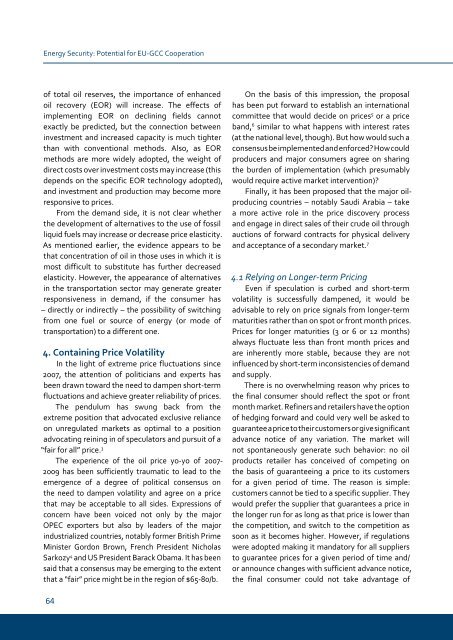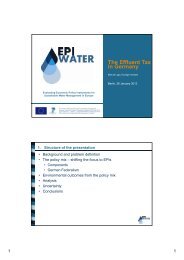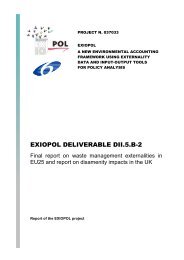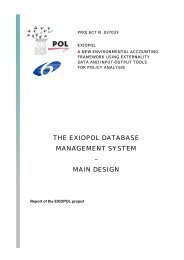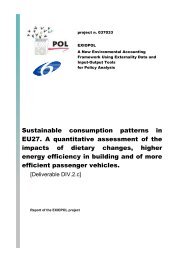Gulf and European Energy Supply Security - Feem-project.net
Gulf and European Energy Supply Security - Feem-project.net
Gulf and European Energy Supply Security - Feem-project.net
You also want an ePaper? Increase the reach of your titles
YUMPU automatically turns print PDFs into web optimized ePapers that Google loves.
<strong>Energy</strong> <strong>Security</strong>: Potential for EU-GCC Cooperation<br />
of total oil reserves, the importance of enhanced<br />
oil recovery (EOR) will increase. The effects of<br />
implementing EOR on declining fields cannot<br />
exactly be predicted, but the connection between<br />
investment <strong>and</strong> increased capacity is much tighter<br />
than with conventional methods. Also, as EOR<br />
methods are more widely adopted, the weight of<br />
direct costs over investment costs may increase (this<br />
depends on the specific EOR technology adopted),<br />
<strong>and</strong> investment <strong>and</strong> production may become more<br />
responsive to prices.<br />
From the dem<strong>and</strong> side, it is not clear whether<br />
the development of alternatives to the use of fossil<br />
liquid fuels may increase or decrease price elasticity.<br />
As mentioned earlier, the evidence appears to be<br />
that concentration of oil in those uses in which it is<br />
most difficult to substitute has further decreased<br />
elasticity. However, the appearance of alternatives<br />
in the transportation sector may generate greater<br />
responsiveness in dem<strong>and</strong>, if the consumer has<br />
– directly or indirectly – the possibility of switching<br />
from one fuel or source of energy (or mode of<br />
transportation) to a different one.<br />
4. Containing Price Volatility<br />
In the light of extreme price fluctuations since<br />
2007, the attention of politicians <strong>and</strong> experts has<br />
been drawn toward the need to dampen short-term<br />
fluctuations <strong>and</strong> achieve greater reliability of prices.<br />
The pendulum has swung back from the<br />
extreme position that advocated exclusive reliance<br />
on unregulated markets as optimal to a position<br />
advocating reining in of speculators <strong>and</strong> pursuit of a<br />
“fair for all” price. 3<br />
The experience of the oil price yo-yo of 2007-<br />
2009 has been sufficiently traumatic to lead to the<br />
emergence of a degree of political consensus on<br />
the need to dampen volatility <strong>and</strong> agree on a price<br />
that may be acceptable to all sides. Expressions of<br />
concern have been voiced not only by the major<br />
OPEC exporters but also by leaders of the major<br />
industrialized countries, notably former British Prime<br />
Minister Gordon Brown, French President Nicholas<br />
Sarkozy 4 <strong>and</strong> US President Barack Obama. It has been<br />
said that a consensus may be emerging to the extent<br />
that a “fair” price might be in the region of $65-80/b.<br />
4<br />
On the basis of this impression, the proposal<br />
has been put forward to establish an international<br />
committee that would decide on prices 5 or a price<br />
b<strong>and</strong>, 6 similar to what happens with interest rates<br />
(at the national level, though). But how would such a<br />
consensus be implemented <strong>and</strong> enforced? How could<br />
producers <strong>and</strong> major consumers agree on sharing<br />
the burden of implementation (which presumably<br />
would require active market intervention)?<br />
Finally, it has been proposed that the major oilproducing<br />
countries – notably Saudi Arabia – take<br />
a more active role in the price discovery process<br />
<strong>and</strong> engage in direct sales of their crude oil through<br />
auctions of forward contracts for physical delivery<br />
<strong>and</strong> acceptance of a secondary market. 7<br />
4.1 Relying on Longer-term Pricing<br />
Even if speculation is curbed <strong>and</strong> short-term<br />
volatility is successfully dampened, it would be<br />
advisable to rely on price signals from longer-term<br />
maturities rather than on spot or front month prices.<br />
Prices for longer maturities (3 or 6 or 12 months)<br />
always fluctuate less than front month prices <strong>and</strong><br />
are inherently more stable, because they are not<br />
influenced by short-term inconsistencies of dem<strong>and</strong><br />
<strong>and</strong> supply.<br />
There is no overwhelming reason why prices to<br />
the final consumer should reflect the spot or front<br />
month market. Refiners <strong>and</strong> retailers have the option<br />
of hedging forward <strong>and</strong> could very well be asked to<br />
guarantee a price to their customers or give significant<br />
advance notice of any variation. The market will<br />
not spontaneously generate such behavior: no oil<br />
products retailer has conceived of competing on<br />
the basis of guaranteeing a price to its customers<br />
for a given period of time. The reason is simple:<br />
customers cannot be tied to a specific supplier. They<br />
would prefer the supplier that guarantees a price in<br />
the longer run for as long as that price is lower than<br />
the competition, <strong>and</strong> switch to the competition as<br />
soon as it becomes higher. However, if regulations<br />
were adopted making it m<strong>and</strong>atory for all suppliers<br />
to guarantee prices for a given period of time <strong>and</strong>/<br />
or announce changes with sufficient advance notice,<br />
the final consumer could not take advantage of


